The foreign ministers of India, Australia, Japan, and the United States (US) met in Tokyo for a meeting to discuss post-pandemic international order and ways to achieve a “free, open, and inclusive Indo-Pacific.” While the Indian Ministry of External Affairs cautiously called the dialogue the “2nd India-Australia-Japan-USA Ministerial Meeting”, External Affairs Minister S Jaishankar did not hold back from describing the meeting as a Quad dialogue on Twitter.
All four ministers exchanged views regarding regional issues related to health security, humanitarian assistance, disaster relief, connectivity, maritime security, and counter-terrorism. They reasserted their firm mutual support to the centrality of the ASEAN, highlighting their readiness towards working with the bloc to achieve a “common vision for the Indo-Pacific.”
Addressing his counterparts from the security grouping, Jaishankar spoke of the need for “collective solutions” from “like-minded” countries to transnational challenges, including recovery from the COVID-19 situation and the “reform of multilateral institutions.” Further, he reiterated India’s commitment to a “rules-based international order, underpinned by the rule of law, transparency, freedom of navigation in the international seas, respect for territorial integrity and sovereignty and peaceful resolution of disputes.”
The meet, which was held in person despite the global health crisis, comes as the stand-off between India and China reaches its fifth month. US Secretary of State Mike Pompeo was the only leader at the summit to outrightly call China out at the meeting, stating in his opening remarks that “As partners in this Quad, it is more critical now than ever that we collaborate to protect our people and partners from the Chinese Communist Party’s (CCP’s) exploitation, corruption, and coercion.” He further insinuated that Beijing’s actions in the Himalayas, the Mekong, and the Taiwan Straits were testament to the fact that the four nations needed to band together to counter its rising influence in the Indo-Pacific.
In a dig at China, although not officially referring to the country, Australian Foreign Minister Marise Ann Payne said that the group is a “diplomatic network” to assist major democracies that believe that the Indo-Pacific should be “governed by rules, not power.” The Japanese foreign affairs ministry also released a press statement revealing that the ministers held a dinner and exchanged views on regional situations in the South and East China Seas and North Korea, but did not reference Beijing or the stand-off at the LAC.
The Chinese Ministry of Foreign Affairs released a statement ahead of the meeting saying, “Instead of targeting third parties or undermining their interests, cooperation should be conducive to mutual understanding and trust between regional countries.” Beijing has previously made its disdain for the grouping clear, calling the Quad an “exclusive clique” that targets third party nations.
At the margins of the dialogue, Jaishankar and Pompeo also had a short meeting where they discussed US-India cooperation on various “topics of international concern,” reaffirming the strength of their bilateral relationship. The leaders asserted the importance of working together to advance security and peace in the Indo-Pacific and across the world, agreeing to continue their close relationship on global issues. They stated that they were looking forward to the US-India 2+2 Ministerial Dialogue, slated to be held later this year. Jaishankar will also be meeting his Japanese and Australian counterparts for bilateral discussions today.
Quad Calls for ‘Free, Open and Inclusive Indo-Pacific’ at Tokyo Meet
The foreign ministers of India, Japan, Australia, and the US met on Tuesday to discuss issues of mutual concern.
October 7, 2020

SOURCE: AP/PTI
